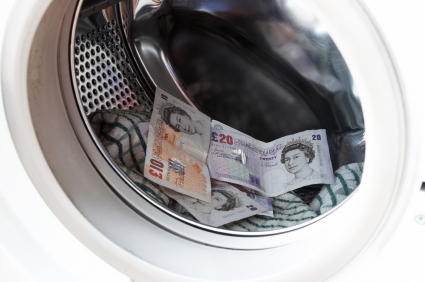UK Drug Dealers Use FOBTs to Clean Dirty Money
Posted on: November 16, 2013, 05:30h.
Last updated on: November 14, 2013, 08:12h.

The high street betting shops throughout the UK are filled with desperate punters and casual gamblers alike, and you could be forgiven for thinking that a handful of them may fall into the miscreant category. But what’s surprising about a number of users is that they are actually drug dealers who are using the facilities not to gamble their ill-gotten gains, but to “clean” them.
Minimal Regulations Make Laundering Easy
Fixed-odds betting terminals (FOBTs) arrived in the UK back in 2001 and are only subject to light regulation, meaning players have been able to bet a reported £100 ($158) every 10 – 20 seconds on some of the machines. And since the average FOBT rakes in around £900 ($1,430) per week in profits, according to industry figures, bookies throughout the country have jumped on board and Britain is now home to 33,345 of these addictive machines.
But now a 24-year-old unnamed drug dealer, who feeds £200 ($316) into the machines at a time while jumping between six betting shops in his local town, told a UK newspaper that using these FOBTs is “what turns dirty money clean”.
He claims drug dealers put their money through the machines, cashing out the majority after taking small losses from their betting system and obtaining a printed ticket which shows that they have been gambling that day. This then gives them a reason to carry large amounts of cash if they are questioned by the police.
Seedy as it may sound, it appears that regulating bodies are aware of this money laundering scheme, since Coral bookmakers were recently fined £90,000 ($143,000) in profits it made from one money-laundering drug dealer who had put around £1 million through its bookie shops.
The regulatory body which fined Coral, the Gambling Commission, also recently announced publicly that FOBTs present a “high inherent money-laundering risk” and warned, in a letter to the industry trade association, about “a retail betting model that includes high volumes of cash transactions, particularly where this includes low individual spend and a high level of anonymity.”
Gambling Act Not Doing Its Job
The 2005 Gambling Act – which now regulates the betting terminals – originally stated that preventing gambling from becoming a source of crime or being associated with crime was one of its primary objectives. Obviously this hasn’t been too successful, as the FOBTs allow the criminals to quickly and easily convert large amounts of real money into digital currency, and then later convert this back to hard cash again. It seems to actually be a very efficient way of laundering money.
Drug dealers apparently use these terminals methodically in order to clean their money simply because the machines are so lightly policed. Some bookies even allow the gamblers to have their funds transferred electronically either to their online gambling account, such as Ladbrokes, or directly into their bank account, a service offered by William Hill, leaving a digital trace which makes the money appear as gambling winnings.
Drug dealers do reportedly have to change up their gambling style here and there in order to go completely unnoticed, but whether or not this is simply enough for the bookies to deny a knowledge of the illegality of their punters or if the tactics actually work is anyone’s cynical guess.
But despite bookies’ statements that they comply with regulatory obligations, it seems unlikely that the individual outlets would turn away money regardless, especially when many “small-time” drug dealers who use the bookies to launder their money are reported to be worth around £15,000 a year each to the betting industry.
Apparently, even clearly stolen bills are easily used on the terminals.
“You have people laundering money every day with cash from robberies and drugs. Do you know that dyed notes from bank robberies can be submitted to the Bank of England and the company gets reimbursed?” explained the 24-year-old drug dealer. “Staff knows what pays their wages.”
Related News Articles
Pair Found Guilty in New Zealand Roulette Scam
INTERPOL Swoops Down in Illegal Gambling Crackdown
Georgia Convenience Store Gambling Raid Puts Three in Jail
Most Popular
Mirage Las Vegas Demolition to Start Next Week, Atrium a Goner
Where All the Mirage Relics Will Go
Most Commented
-
Bally’s Facing Five Months of Daily Demolition for Chicago Casino
— June 18, 2024 — 12 Comments















